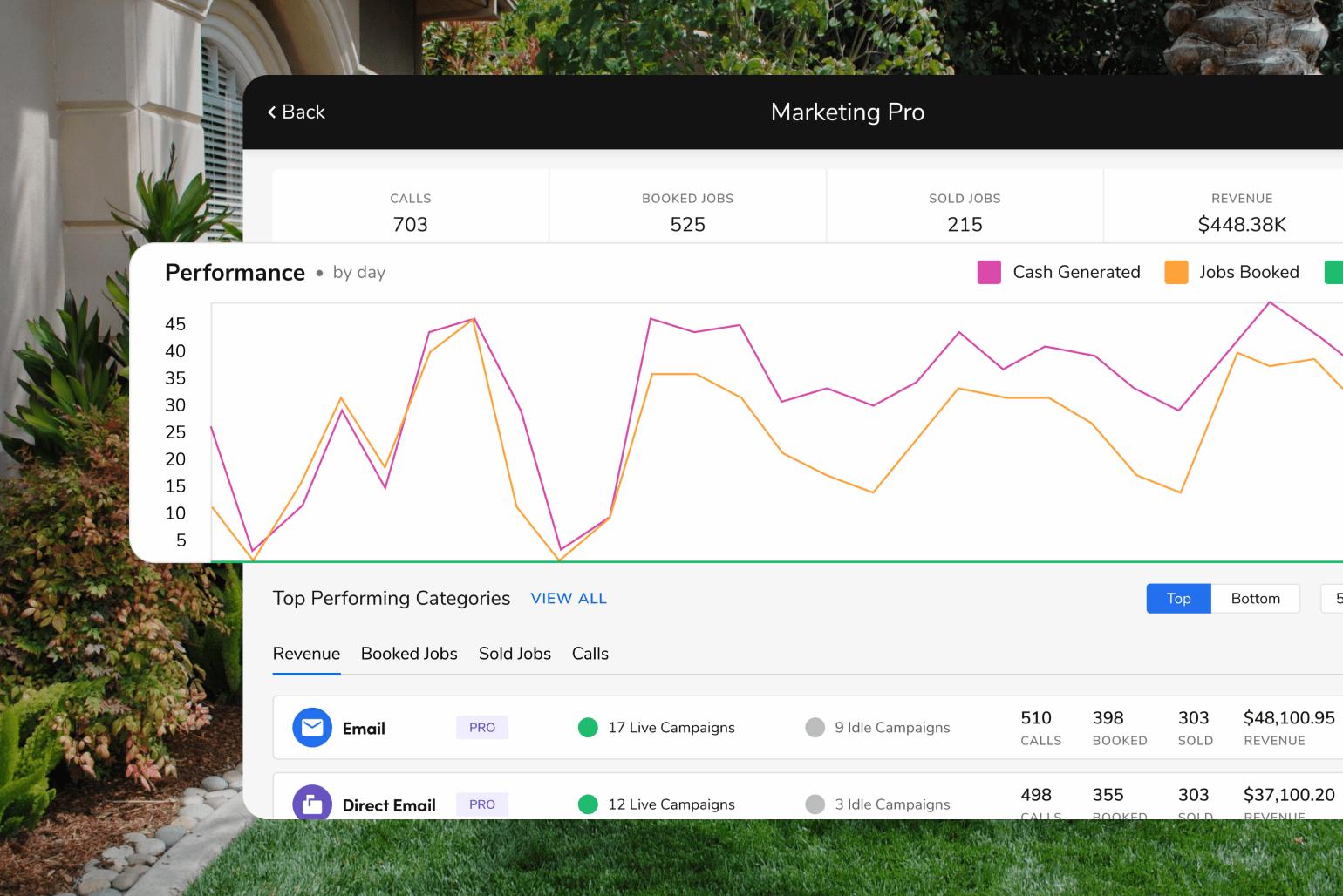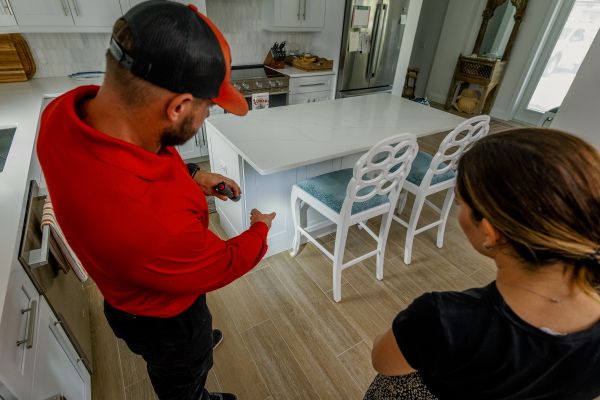Pest Control Sales Script Guide (Increase Conversions)

A sales script is crucial for increasing conversions and overcoming objections in the pest control industry. With the pest control market growing by $7 billion by 2026, capturing leads and converting them into customers is more important than ever.
What's more, there are ample opportunities for more pest control sales, as these statistics demonstrate:
4 out of 5 U.S. hotels and motels had bed bugs in the past year.
Termites cause over $5 billion in property damage in the U.S. each year.
Half of all American homeowners have an ant problem yearly, making ants the #1 pest in the U.S.
14.8 million U.S. homeowners saw rodents in their homes between April 2020 and April 2021.
West Nile virus, spread by mosquitoes, killed 167 people in the U.S. in 2018.
However, many sales teams struggle to keep customers engaged and address concerns during calls.
This guide will walk you through how to create a pest control sales script. It will help you close more deals and address customer pain points.
Why Does My Pest Control Business Need a Sales Script?
A pest control sales script is a powerful tool to increase conversions and consistency in your pest control business. Whether you’re dealing with inbound leads or cold calling, a script ensures every interaction is professional and effective.
Here’s why every pest control company should generate a sales script:
Consistency: A sales script ensures your team says the same thing about pricing, services, or customer concerns.
Confidence: Sales reps feel more prepared and confident during calls when they know what to say.
Overcoming Objections: A good script helps salespeople handle common objections like price or skepticism about pest control services.
Professionalism: Following a script creates a smooth, trustworthy process and builds customer credibility.
By giving your sales team a pest control sales script, you can close more deals and appear more professional.
What Are the Key Elements of an Effective Pest Control Sales Script?
A pest control sales script is key to your sales team delivering a consistent message to customers. A good script should engage the customer, address their concerns, build trust, and guide them to the close.
Here are the must-haves.
1. Introduction & Building Rapport
First impressions count, and your pitch's intro sets the tone for the entire call or face-to-face pitch. A friendly and engaging opening helps you build rapport and create a connection that builds trust. Personalize the script for each customer; this shows you care about their specific needs and not just a generic response.
Tips for building rapport:
Start with a polite greeting and use their name.
Reference something about their area or property to make it relevant.
Show genuine interest in helping them with their pest problems.
Example: "Hello, Mr. Smith! My name is John, and I am with [Your Pest Control Company]. I see many homes in your area have had termite issues lately. I’d love to help keep your home pest-free. Have you had any pest problems recently?”
Personalizing the intro keeps the conversation alive and positions your pest control services as a solution for each customer.
2. Asking the Right Questions
Asking the right questions is vital in uncovering customer needs and guiding the conversation to a solution. Open-ended questions encourage customers to share their experiences and concerns so your sales rep can tailor the pitch.
Key questions to include:
"What pest problems have you had in your home?”
“Have you used pest control services before?”
“What worries you most about pests in your home?”
These questions help identify the customer’s pain points and where your service can add value.
Example: “I’d love to know—what’s been showing up around your home recently? Ants, termites, wasps? We have solutions for those specific issues.”
This gets the customer to share their concerns so you can position your pest control services better.
3. Positioning Your Services
Now that you know the customer’s needs, explain how your pest control services can solve their problems. Position your services to speak directly to their pain points – health risks, property damage, or the hassle of pest infestations.
Focus on:
How your services protect their home and family from pests.
Long-term benefits and prevention. You are more than just a quick fix.
Examples of how your company has helped similar customers.
Example: "Our termite control service protects your home from costly damage. Last year, termites caused over $5 billion in property damage in the U.S. alone. We’ll keep your home safe so that you can rest easy.”
Your door-to-door pest control sales will solve their problems by speaking to the customer's specific issues.
4. Handling Objections
Every salesperson gets objections, whether about price, service that doesn’t meet expectations, or their own DIY pest control failures. A good script should prepare your team to handle those objections.
Common objections and how to address them:
Price: Emphasize long-term pest prevention.
Skepticism: Share success stories or customer testimonials.
DIY: Highlight the expertise and comprehensive nature of professional services.
Example: "I know price is a concern, but remember, investing in professional pest control now can save you from costly repairs later. DIY methods don’t address the root cause, and that’s why many homeowners call us after trying on their own.”
Handling objections directly shows the customer you understand their concerns and that your sales calls, whether in person or over the phone, are helpful, not merely selling.
5. Closing the Sale
Now that you’ve addressed the customer’s concerns and positioned your pest control services as the solution, it’s time to close. Closing can be difficult over the phone compared to door-to-door sales, so create urgency and a clear next step to guide the customer to a decision.
Closing techniques to use:
Offer a limited-time discount or promotion to create urgency.
Ask for a preferred appointment time, and avoid using open-ended questions.
Reiterate the value they’ll get by taking action now.
Example: "I have a technician in your area this Thursday. Would the afternoon or morning work for you? If you start now, you’ll be pest-free before the holiday season begins.”
Closing with a clear action step should be a pivotal part of your sales training. Once you’ve mastered closing, you’ll make it easier for the customer to say yes.
By following these steps, your pest control sales script will help your team connect with prospects, address their concerns, and close more sales.
What Are Some Common Objections?
Even with a good pest control sales script, you’ll get objections.
Objections are common in any sales process, but how you handle them will determine whether you will close the sale.
Here are some ways to handle common objections your sales team will hear.
“Your price is too high.”
When a customer raises price as an objection, it’s time to reframe the conversation from cost to value. Emphasize the long-term benefits and peace of mind that come with professional, high-quality services.
Tips to handle this objection:
Focus on the value of preventing costly pest damage like termites
Explain professional pest control is long-term prevention, not short-term fixes
Mention any warranties or guarantees
Example: “I know price is a concern. But investing in professional pest control now can save you from costly repairs later. For example, termites cause over $5 billion in property damage each year. We’ll keep your home safe so that you can rest easy.”
“I’m already using another pest control service.”
This one requires a degree of tactfulness.
Don’t push too hard.
Instead, highlight what sets your pest control company apart: better customer service, advanced treatment methods, and eco-friendly or more reliable results.
Tips to handle this objection:
Respect their current service but offer a competitive edge
Highlight any special services or technology your company offers
Offer a free inspection or trial service to showcase your expertise
Example: "It’s wonderful news that you’re already protecting your home! What we offer that’s different is our eco-friendly pesticides and packaged deals, keeping you pest-free all year all-year-round. I want to offer you a free inspection so we can give you a competitive quote with no obligation.”
“I can handle pest control myself.”
Many homeowners think they can manage pests themselves, but it’s important to emphasize the expertise and thoroughness that come with professional service.
Point out that DIY solutions are only temporary fixes while professionals get to the root of the problem.
Tips to handle this objection:
Once again, stress long-term solutions over short-term fixes
Explain the risks of incomplete treatments or misidentifying the pest
Give examples of how professional pest control can prevent major infestations
Example: “DIY pest control works for minor issues, but it only addresses the symptoms, not the root cause. Our trained technicians use specialized equipment and treatments that provide long-term protection so pests can’t come back.”
By anticipating these common objections and addressing them head-on, your sales team can build trust with the customer and increase their chances of closing the sale.
What Are the Best Practices for Using Pest Control Sales Scripts?
A good pest control sales script provides structure, but it is just as important to make the conversation feel natural and tailored to the customer.
While a script gives guidance, the key to success is how it’s used.
Here are some best practices for using sales scripts in the pest control industry.
Best Practices:
Keep it natural: While following a sales script, keep the tone conversational. It should feel like a real conversation, not a sales pitch. This builds rapport and trust.
Adjust to customer personas: Not all customers are the same. Tailor your pitch to the customer, whether a homeowner, property manager, or business owner. Adjust your message to their needs and priorities.
Listen actively: Although a script guides the conversation, listen carefully to what the customer says. This way, you can adjust your response based on their concerns or questions.
Handle objections with confidence: Prepare responses to common objections, such as price or skepticism about your pest control services. A good script has solutions and answers to these challenges.
Role play: Regular role-playing with the sales team helps improve script delivery and performance. Role-playing different scenarios ensures reps are ready for any situation.
Be flexible: Sometimes, the conversation won’t follow the script exactly. Be flexible and adapt as needed to keep the conversation smooth while still guiding the customer to the desired outcome. Remember, sales in person differ from sales over the phone, as you cannot use your body language to convey your points. Remember to adjust your call scripts accordingly.
By following these best practices, you’ll see a big improvement in how your sales team uses scripts to close more deals and increase customer satisfaction.
How Can FieldRoutes Automate and Enhance My Sales Process?
FieldRoutes has tools to automate and simplify your pest control sales process, allowing your team to close more deals and be more efficient.
By integrating FieldRoutes into your pest control business, you can streamline lead tracking, customer communication, and activity management, improving your sales workflow and overall performance.
How FieldRoutes Boosts Your Sales Process:
Automated Lead Tracking: FieldRoutes automates lead tracking so you can manage prospects more efficiently by capturing and organizing leads in real-time. No opportunities are missed, so your sales team can focus on closing deals.
Customer Communication: Automated communication tools keep your sales reps in touch with prospects and customers at the right time. Whether it’s follow-up emails, appointment reminders, or service updates, FieldRoutes will keep your customers engaged.
Pipeline Visibility: The software gives you complete visibility of your sales pipeline so that you can view every stage of the customer journey. The CRM is excellent for tracking customer touchpoints from the initial inquiry to the final sale. You can easily track all interactions and sales progress.
Mobile Access for Technicians: The FieldRoutes mobile app gives your technicians access to sales tools. They can track activity, manage records, and upsell services to existing customers, increasing overall revenue.
Boost Sales Performance: With all sales data in one place, your sales team can focus on what matters most – getting new customers and closing more deals. Automation removes administrative tasks, so there’s more time for customer interaction.
FieldRoutes’ automation can change how your pest control business sells and grows.
It’s Your Turn Now
A good pest control sales script will improve conversion rates and customer satisfaction.
Using a script that covers rapport, asking the right questions, and common objections, your sales team will close more deals. Automation tools like FieldRoutes will simplify the process by tracking leads, communication, and performance.
Get started today and refine or create your pest control sales script to easily close more deals.
Book a demo of FieldRoutes to see how it can boost your pest control sales.





